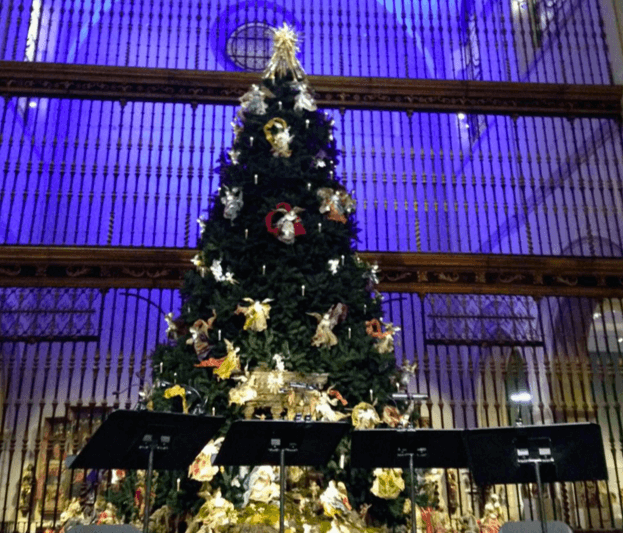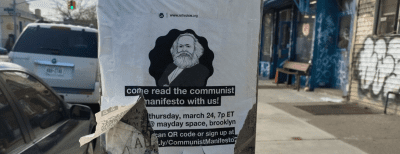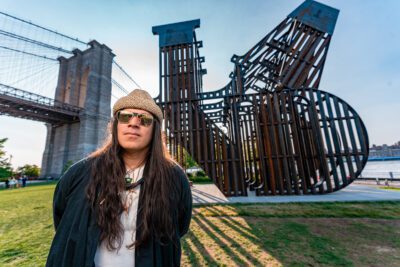The Last “Last Noel”: Going to Anonymous 4’s Final Concert at the Met

Pre-concert
photo by Molly McArdle
When I was little, maybe seven or eight, I would take my mom’s Anonymous 4 cd, On Yoolis Night, and bring it and our portable cd player into my room where I would climb into bed and listen to the album over and again. I sometimes, often, I would make a tent of sheets and sit inside it with the cd player and a book. Still today On Yoolis Night reminds me of Narnia. Still today, On Yoolis Night makes me feel safe.
Anonymous 4 is—was—a group of four women singing primarily medieval music a cappella. People like what they like, and a lot of people don’t naturally gravitate towards this direction: the medieval direction, the a cappella direction. But Anonymous 4 has spent their 30-year career converting skeptics: their debut album, 1993’s An English Ladymass, was the first of medieval chant (unaccompanied monophonic—one melodic line without harmony—sacred song) and polyphony (like chant but with two or more melodic lines) to make Billboard’s classical chart. Within their first three years of recording, they had three albums place in that chart’s top 15. They’ve since recorded over 20 albums and sold more than 2 million records. Anonymous 4 is, if you are in their gravitational orbit, a big deal.
Their music is also genuinely beautiful: their voices united, pellucid, radiant. But except for their rich and deep catalog of recorded music, it’s over. As of December 2015, Anonymous 4 has retired after 30 years for probably forever. And I went to their last ever concert.
“I discovered them as a Juilliard student at the Met,” says Limor Tomer, the Metropolitan Museum of Art’s general manager of concerts and lectures. “They bring that music to life in a way only they can do, with their own kind of power.”
“When [Anonymous 4] called and said they’d like to do their last concert here at the Met, we all collectively decided to do it here at the medieval sculpture hall,” she says. Anonymous 4 had performed at the Met for a good part of their three-decade history, which made the decision a natural one. “I don’t use Met galleries as fancy and expensive backdrops for performances,” Tomer explains. “There must be an organic and important and real connection. We have to articulate why and how the work relates to the gallery. The difference is in the intentionality.”
Anonymous 4 performed “The Last Noel,” a one hour program of Christmas music spanning their repertoire, twice on Tuesday, December 22. “It sold out in 48 hours,” Tomer says, laughing. “We put it out online and it just goes. It was basically like a rock concert.”
But how is a 30-year-old early music a capella group’s performance like a rock concert? Or, more specifically, why do Anonymous 4 generate the fervor they do, an intensity of enthusiasm not often seen within the realm of classical—much less early—music? I mean first, they are really fucking good. I cannot imagine anyone doing what they do and doing it better. You cannot sound better than Anonymous 4 singing Anonymous 4. Second, there just aren’t a ton of people (women especially) doing what they do. It is a rare, beautiful thing—both because it’s not something you’d casually hear in day to day life and because it’s sung across time, whether it was first performed 1015 or 150 years ago.
“The recording company insisted that we get a note from a musicologist that said women could sing these things,” Susan Hellauer (the group’s alto and medieval music researcher) tells me over the phone. “They were afraid of the French critics, that they would come down on us for having women sing works that were written for men: ‘This is distorting the repertoire, it’s incorrect.’” Her voice rises—there’s more than a little incredulity in it. “There are examples of polyphony at convents! Pieces of music that say on the front, ‘We are nuns and we are singing this polyphony.’ We know women sang chant.” They eventually secured a letter from Alejandro Planchart, a professor of medieval and renaissance music at the University of California, Santa Barbara. “It wouldn’t happen in the big cathedrals,” Hellauer admits of women performing sacred music in medieval Europe, “unless there was some sort of Yentl situation. But we’ve read complaints lodged by bishops about how high in pitch these men sang. We don’t sing stratospherically high, so we can’t sound much higher that.”
Anonymous 4 has an origin story fit for a garage band, minus the garage. “It was just one of those things that happens all the time,” Hellauer says over the phone in October. “Musicians get together to sing some songs for fun.” The four women—Marsha Genensky, Susan Hellauer, Ruth Cunningham, and Johanna Maria Rose—all lived in or around New York and all sang in choirs. They were curious about how medieval sacred music sounded when sung by women. “I knew my way around a library,” Hellauer explains. “We did everything ourselves. It was more about how we felt. We had this little group, and we thought, let’s do it.” Though there’s been some shuffling of group members—Ruth Cunningham would leave in 1998 to be replaced by Belfast-native Jacqueline Horner-Kwiatek, and when Johanna Maria Rose left in 2008, Cunningham returned to replace her—they’ve all spent a significant amount of time singing together.
“I remember our very first performance in Europe in 1989,” Hellauer says in the same tone another musician might describe playing Carnegie Hall. The organizers of the music festival they were performing at had picked out a venue for them—a church in Bavaria that matched the time period of their music. “There we were,” Hellauer says, “in Europe, singing European music to European. That was like, ‘Okay, we did it.’ They know we are American and they still like it.”
Over the course of their 30 years, Anonymous 4’s repertoire has expanded to include the work of new composers as well as traditional Americana. Pulitzer Prize-winning composer David Lang (whose Little Match Girl Passion played at the Met the day after Anonymous 4’s finale), two time Grammy award-winning composer Christopher Tin, and minimalist pioneer Steve Davies, have all composed for the group.
“I’d always known about their sound—haunting, pure and beautiful,” Tin says. They worked together on Tin’s first album, Calling All Dawns: he composed for them a piece inspired by an 18th-century Irish epic poem. “But what I got to learn about them through working with them is their deep and impressive dedication to scholarship and authenticity.”
“They were a dream to work with,” he says. “I only wish I’d started working with them sooner in my career.”
Musician and novelist John Darnielle, who worked with Anonymous 4 on the Mountain Goats album Transcendental Youth, frequently sings their praise. “What a gift to have been alive during the age when [Anonymous 4] performed and made albums,” he tweeted last February, calling their last studio album, 1865, a collection of Civil War-era music, “tremendous.” Darnielle received An English Ladymass as gift at the end of college and the music carried him through the last push of papers. “I am a huge [Anonymous 4] fan,” he said in January 2012, and in 2011: “Twitter fan letter No. Whatever: Dear the Anonymous 4, nobody is even worthy of you least of all myself, thank you for being 100% awesome.”
In 2009, for the website eMusic, he said of the group’s music: “I feel such gratitude for Anonymous 4 albums; they always do the job. You know how incense packages make these claims about how their products are gonna purify the air and cleanse it of toxins and restore balance to an ailing world? The Anonymous 4 actually do all that without even making a big deal about it.” And again this past fall he said via email, “I will happily testify to the huge different Anonymous 4’s music has been making in my life since the early 90s!”
Composer Lang joins the chorus of praise and thanks. “I am so honored that I was able to sneak in there towards the end, and get the chance to work with these amazing musicians.”
In the years since I snuck away to my room with On Yoolis Night, Anonymous 4’s second album, their music has moved from my tiny boom box to my Discman to my iPod and now iPhone, and I listen to it while reading not only C.S. Lewis but all manner of books (most not even fantasy), and many times when I’m not reading at all. I listen to Anonymous 4 when I feel upset or quiet or thoughtful or sad or romantic (mostly in the 19th-century sense) or hopeful or desirous of magic. It is a music of possibility, but one that is also deeply rooted in a real, historical past. In some ways it is a miracle that it even exists, that we can listen to the (roughly) same sounds that these people so far gone also listened to. It’s a miracle too that it sounds like this, the way that Anonymous 4 sounds. I have most of Anonymous 4’s discography now, but On Yoolis Night remains my favorite. It’s very near the top of my most played music in iTunes. It is there for me to use and I use it.
It was hard for me to imagine what an Anonymous 4 concert would be like, much less an Anonymous 4 concert at the Met, much less Anonymous 4’s last concert ever. And I don’t mean like literally, my powers of imagination aren’t that poor. I mean the difficultly came of how I expected to feel to hear in person in this place in this particular (and pretty dramatic) context the music I had carried with me for over two decades. What else was I listening to at the time? What else has survived this long or stayed this close? The answer is nothing else, which for me is a testament to the power of Anonymous 4’s music. It’s not timeless—that is kind of stupid to say—but its time-y-ness I think is what gives it so much of its power. It is so much itself.
I had already gone home for Christmas but I came back to New York for the night for the concert, Anonymous 4’s very last “Last Noel.” I headed for the Met as soon as my bus got in—I didn’t have anything else to do—and was surprised to find a line had already started over an hour and a half before the ticketed start time. I wanted to sit and do some transcribing but instead I joined the snake of people: I too wanted a good seat. The room was (surprise) beautiful: intimate and Christmas-y, medieval and beautifully lit, with the Met’s great tree rising behind the stage. The program listed several songs from On Yoolis Night (yes, I checked) and full sets of lyrics, in both their original language and in translated English. That was new, to really understand the words being sung. I sat and felt like something from inside my head was pouring out of it, a private beauty had been made public sublime.
You should know that I cry all the time about art. Recently I cried at The Messiah, I cried at a performance of the Great Plains Dance Company, I cried at Anonymous 4. I don’t know if I would say that I like crying but it is something I do. It felt like so much.
When Susan Hellauer talks about their last tour, she talks about how moving it’s been to hear “the stories from people from how our music was used.” One person told her said their partner used it as he died. “I burst out crying,” Hellauer says. “When individual people say what it meant to them in difficult circumstances, when they say that our music helped them. That’s all I need really. I wasn’t thinking about anyone’s pain or suffering,” when she was working on the music. “We were just trying to practice and sing in tune.”
When it was over, the standing ovation lasted long enough for Anonymous 4 to come out three times. They looked at each other and smiled. They looked at each other so much the whole concert. I imagine that’s how they make it work, the sound of their voices together.
“It’s like Christmas when that concert happens,” Hellauer tells me in October, describing how she feels about their regular appearances at the Met’s medieval sculpture hall. “We always exchange our Christmas presents under the tree.” When I spoke to her after the concert, she says, “I kept looking at the corner of a column to keep from crying. Crying and coughing.” She had come down with bronchitis, an unplanned complication. But the concert program is the same they’ve been performing all season. “It’s routine,” Jacqueline Horner-Kwiatek says, “but different too because of today.”
“We’re not going away!” she insists to me laughing. “People have been talking to me like we’re retiring.” They are, she explains, just going on to do different things. They won’t stop making music, just different kinds and in different ways. Horner-Kwiatek is finishing a doctorate at Julliard, Hellauer leads chant workshops and volunteers as an EMT and ambulance driver, Cunningham works in sound healing, Genensky (who often served at Anonymous 4’s tour manager and music director) is involved with the funding and support of music performance. They all, of course, will still sing. And for those who cannot bear their separation, a 30th anniversary anthology will come out in 2016.
“It’s like a giant family of children,” Hellauer says in October of compiling that anthology, rightfully proud and confident in her work. “The thing about this project—we made a lot of music!”
In December, though, she is more reflective. “It has been heavenly,” Hellauer says. “To find all this music. Sitting in all those libraries.”
You might also like 



















